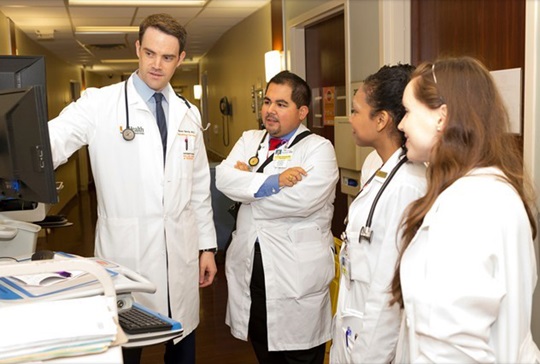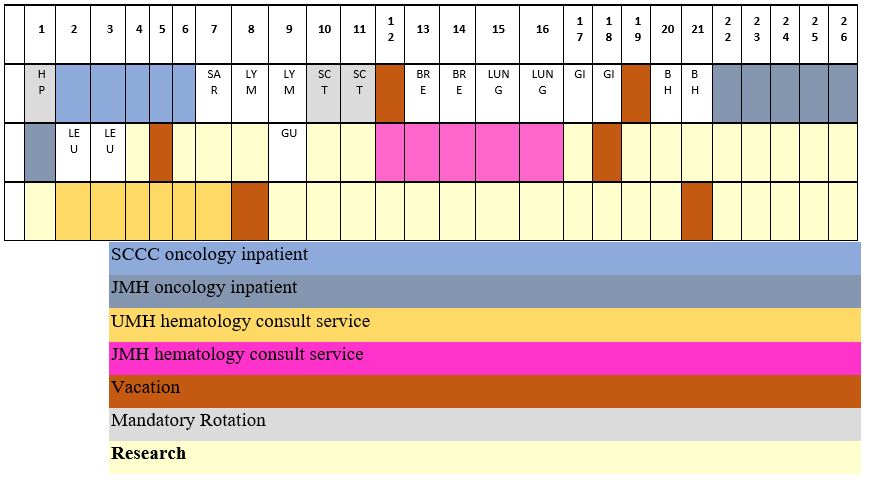 Fellowship Tracks
Fellowship Tracks
During the first year the fellow will complete the inpatient rotation on the JMH inpatient Service, the JMH inpatient Oncology Consultation Service, Hematopathology, Benign Hematology and SCT. The fellow will pick Structured Electives that will offer a broad range of experience with different SDGs and introduce them to many members of the faculty. During this time the first year fellow will decide what their career goals are with the help of their advisor and formulate a plan to attain them. By the end of their first year or during the first 6 months of their second year the fellow will be able to pick one of four fellowship tracks. This plan must be in written form and must be approved by the Clinical Competency Committee.
Defined Fellowship Pathways
- Clinical Research Track-designed to enable the career development of a clinical investigator
- Fellow is mentored by a clinical investigator
- Fellow is expected to write a clinical trial
- Fellow should attend ASCO/AACR/ESMO clinical research workshop (or similar meeting)
- Fellow will apply for a ASCO YIA
- Publications are expected
- Research lecture to the Division in third year
- Public Health/Global Health/Health Equities Track-designed for the Oncology Fellow who has a passion for epidemiology, global health or disparity research
- Fellow will be mentored by Dr Gilberto Lopes
- Fellow will pursue research projects that align with an interest in Global Health
- Fellow should attend ASCO/AACR/ESMO clinical research workshop (or similar meeting)
- Fellow will apply for a ASCO YIA
- Publications are expected
- Research lecture to the Division in third year
- Laboratory/Translational Track
- Fellow is mentored by a translational researcher with a laboratory.
- Fellow will have a translational project in the mentor’s laboratory.
- Fellow will apply for a ASCO YIA
- Fellow will attend AACR molecular workshop (or similar meeting)
- Fellow should attend ASCO/AACR/ESMO clinical research workshop (or similar meeting)
- Fellow may opt for single board certification option ie: Oncology only, Hematology only or pursue a fourth year as an clinical instructor
- Publications are expected
- Research lecture to the Division in third year
- Clinical Track-designed for the fellow who is intellectually curious but does not want a career in academic medicine
- 2 JMH clinics+2 SCCC clinic/week during the Second Year and Third Year
- Must lead Q/A projects each year
Curriculum
As academic physicians we are expected to be excellent clinicians who deliver care at the highest level, researchers who discover and develop the newest treatments and technologies and clinical educators who educate the next generation of physicians. Clinical Education in the fellowship includes inpatient rotations, outpatient continuity clinics, structured electives and one-on-one electives with individual attendings. There are multiple tumor boards to attend as well as conference series, journal clubs and the core curriculum lectures. The fellowship pays for attendance at one high impact conference/year and provides the ASCO Essentials for Oncology Fellows and the ASH Fundamentals for Hematology Fellows. Fellows are encouraged to attend other conferences is feasible. The Research Curriculum includes: Research Day (a meet and greet for first year fellows with our research faculty), a 4 week research module which teaches research techniques, theories and statistics, Grant Writing Workshops twice/year and a chance to qualify for a Research Track Fellowship. In a research tract the fellow is expected to apply for an ASCO YIA, publish and has up to 18 months of protected time for their research project. Any fellow with a poster or oral presentation at a high impact national meeting has their expenses paid by the Cancer Center. Creating Educators is a stepwise process that starts in fall of the first year of fellowship with didactic lectures on how to give a presentation, delivering feedback and making use of the teachable moments. The fellows are then encouraged to implement these lessons with short weekly workshops. The fellows are responsible for the didactic lectures in our weekly Board Review course and lead some of the small group sessions in the Internal Medicine Hematology/Oncology Core Curriculum. The Second year fellow is expected to present a clinical lecture at the Divisional Grand Rounds and the Third year fellow must give a presentation of their research project at Divisional Grand Rounds.
Yearly Schedule
First Year fellows:
Emphasis on attaining Clinical Competency
- Inpatient Oncology Service at JMH
- Inpatient Oncology Consultation Service at JMH
- Benign Hematology
- Hematopathology
- Stem Cell Transplant
- Structured Electives
- Vacation
- Choose Fellowship Track and Mentor
Second Year Fellows:
Emphasis on research training and developing skills as a clinical educator.
- Inpatient Hematology Consultation Service at UMH
- Research
- Individual Electives
- Present clinical topic at grand rounds, present board review lectures, conduct small group sessions in the IM core
- curriculum
- Vacation
Third Year Fellows:
Emphasis on final development of the skill set necessary for attainment of specific career goals
- Inpatient Hematology Consultation Service at JMH
- Research
- Individual Electives
- Present personal research topic at grand rounds
- Vacation
Example of a three year curriculum
Contact
Grace Polanco
Fellowship Coordinator
305-243-2201
Email: gxp411@med.miami.edu
